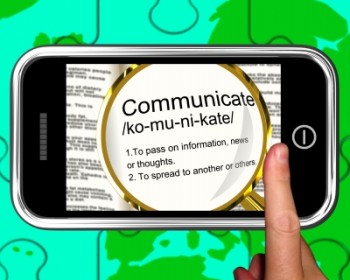
Last week I blogged about some qualities every freelancer should have to be successful – one of them being good communication skills. Today, I will share some tips to effective communication with freelance clients.
If you are working online and don’t have personal meetings with your clients, you should follow some basic rules and etiquette for effective online communication. They are certainly not universal and don’t guarantee your success as a freelancer, neither they are an exhaustive list. I found these tips empirically during the last few years while working as a freelancer and with other freelancers as a client.
1. Use proper language
You may be used to abbreviate words or skip them altogether with your friends on Skype but remember you have business relation with your clients. Depending on how long you have worked together or what type of business relation you have, your tone can be rather friendly than formal. Whatever the case, presuming upon a short acquaintance is never a good idea.
Chat abbreviations like gr8, 4u, ty, yw, thru, etc. are absolutely inappropriate. Abbreviations like FYI, info, btw, pls, etc. may be appropriate when communicating with certain clients but not during your job interview or in the beginning of your business relation.
If needed, re-read my post about literacy and how it matters to your freelance success. Proofreading your email before hitting the Send button is always a good idea for a good first impression
2. Reply in timely manner
If a client sends you an email with information or with questions and changes request, reply to him within the next 24 hours.
Don’t reply instantly if you see their email right away. Instant communication may create an expectancy that you are always there and replying instantly, always. They would develop a feeling of delay if sometimes you reply within a few hours and not instantly.
Think carefully how much time you’d need to reply depending on the situation. If the client’s email requires some thinking to answer the questions asked; or estimation of time needed and re-calculation of a price – take your time. If you cannot address the email within 24 hours, then email them back confirming you got the message and giving a date when you will be able to give them the required information. This way you first demonstrate your professional attitude, and secondly help your client plan their time and schedule according to your time frame.
3. Never let the communication frustrate you
Whether due to language barrier or poor verbal communication skills, miscommunication isn’t rare; especially in the beginning of a business relationship when freelancer and client are not yet used to each other work model, behavior and habits. Don’t get frustrated! Don’t repeat over and over the same thing. After all, if you do the same thing, you can’t expect different result
Try explaining your point with other words, with screenshots, with stories, or with an example. If your client has difficulties communicating effectively, then tell to them what is not clear. Ask them to explain with other words, too.
Under no circumstances should you burst out shouting. Never give in to feeling helpless. Stay calm, be patient and try until you succeed. This advice is good if you have had troubles communicating effectively once or twice during your work together.
If you notice during the interview that your client has inability to articulate his thoughts, well – maybe your daily work with them would be the same. Better decline and move on to another client. Bad communication can be a red flag for bad clients – follow the link to see more such signs.
4. Always have written confirmation of change requests
If you often use Skype to discuss with your clients changes, project scope and suggestions for improvement, I suggest you summarize what you have agreed on during the call and send it to the client for confirmation. If you don’t do this, you might potentially have a problem in the future. As verbal communication doesn’t leave a written trace and people tend to forget with time. Having all change requests confirmed in written will save you the trouble if the client forgets he has asked for the change or agreed to additional budget for it.
5. Always be honest and ask questions if something isn’t clear
I have always been amused how freelancers take up a project and then ask for help and for more details their friends and colleagues. This usually leads to bad results, work in the wrong direction, sometimes even starting over, wasted time and money and a lot of disappointment for both the freelancer and the client.
The best source of additional information and details is the client, nobody else. It doesn’t matter if the questions and lack of clarity comes during the freelance interview or after you have started working – ask, always! This is the only way a freelancer can complete a project with the agreed quality and turnaround time.
No freelance client would think less of you if you ask questions. To the contrary – your questions would let them know you are thinking through every single step of your involvement in the project and you are devoted to completing the job with the highest quality possible.






I would avoid trying to make jokes or be humourous since not everyone has the same sense of humour.
Some might deem humour to be unprofessional, too.
Excellent point Lorraine, humor is pretty personal, unless you know someone it always has to be gentle or not present at all.
i totally agree with you, Lorraine and Debra! In my experience, it is only after months and sometimes years working with someone online when i am comfortable enough to make jokes and share humor with a client. Thanks for the addition!
Yeah, no kidding – especially since there are different types of humour.
Maybe the saying shouldn’t be “No money, no funny” but “Money, no funny” since clients are paying you to be professional!
LOL at this one!
Diana,
Great advice, especially #5!
When you work at a regular job, you know after a short period exactly what your boss wants. And your boss assumes—rightly so—that you understand what he wants. This spoils clients when they work with a freelancer.
One of the biggest problems I have is with client acronyms and jargon. It’s tempting to say to myself, “Oh if only I had read the latest Seth Godin. He probably said that.”
It’s best to ask immediately for clarification, even if we feel silly for asking. It’s easier than scrolling through lots of Google pages and hoping we’ve picked out the right term.
-Diana Schneidman
Thanks for stopping by, Diana – and for your addition. Abbreviations can be tricky indeed – especially when the same abbreviation means different things in different areas (e.g. transportation and marketing?!) and to be even harder – it has a third meaning in the internal communication of the company – it’s just your client forgot to mention it… and since you didn’t ask, well… next time do ask
Great point, thanks for adding it!
All important reminders, though #4 is one I’m extra-diligent about. After my first few editing projects, I also developed a contract that clearly outlines the scope and expectations of the project.
thanks for your comment, Jeri, and for sharing your insights. I think it’s high time i got a ‘sample contract’ done as well. I too much rely on freelance websites doing that for me…
What a wonderful post. It is so important to communicate in a professional way to clients both external and internal clients.
Thanks for your comment, Susan! What do you mean by external and internal clients? aren’t they all external if they are clients? Help me better understand your point, thanks!
Another great post Diana. It amazes me how often people presume that they are understood in business exchanges without verifying. If I had to add a bit of advice it would be, never presume anything. Ask and double check if you have to. It’s always faster to get it right the first time than to assume and spend a lot more of your time correcting.
I love the point you made about using proper language, not only are the abbriviations irritating because they need to be deciphered, but they leave me wondering about the maturity of the writer.
Right, thanks for your comment, Debra! I quit making assumptions a long time ago – i even forgot – hahaha!
We hardly ever know what’s going on in the other party’s head and we sure don;t know it if that party is a new or potential client. so yes – ask, ask, and ask. Thanks for including this as an important point to consider!
Very good article. I would add: be very transparent about what you can and can’t deliver. It’s better to over communicate about work deliveries as well. Also, getting things confirmed in writting is crucial as it will save frustration and misunderstanding.
right, overestimating your skills and landing a job because you have lied about your abilities never ends well. Spot on addition, Diane – thanks!